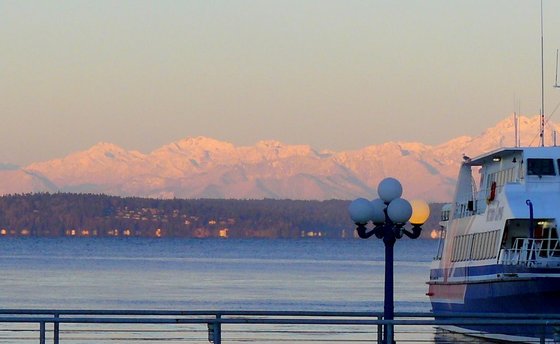This week on Cornichon: a look at the state's fourth-largest industry, tourism
Compare the enlightened legislature in Texas (previous post) to the wimps in Olympia. Washington's tourism promotion budget ranked close to the bottom of the 50 states with a paltry $1.8 million, now trimmed to zero. Oregon spends $10 million, Idaho $7 million, Montana (Those Metro bus boards! Those mountain goats!) over $9 million. California spends $56 million to promote tourism. British Columbia's budget is a whopping $60 million, paying to promote tourism to Vancouver, to Vancouver Island, to the Okanagan wine country, and other destinations.
Ed Murray, chairman of the state Senate's Ways & Means Committee, which cut tourism promotion out of the state budget, told Crosscut writers and editors recently that he does believe the state should invest in tourism, "but not when the alternative is cutting teacher salaries." Yet that's a false choice. You don't pay for tourism promotion with money that could have gone for teacher salaries, it's the other way around: you pay teachers' salaries with tax dollars you raise from tourism.
Tourism is big business. King County Executive Dow Constantine points out that 50,000 jobs in the county depend on tourism. Nine million travelers visited King County last year, spending $5.5 billion and generating $440 million in local taxes. In fact, it's Washington's fourth largest industry, generating 150,000 jobs and a billion dollars in tax revenues statewide.
David Blandford of the Seattle-King County Visitor Bureau (the marketing arm of the state Convention Center) points out those tax revenues, the billion dollars associated with tourism, are paid by visitors, not local taxpayers. Taxes generated by tourism lower the tax bills of in-state households by nearly a thousand dollars a year, Blandford says.
And yet, this seeming no-brainer is a hard sell.
City Councilman Tim Burgess, an ex officio member of the Visitor Bureau's board of directors, laments that it's an uphill battle to persuade budget-writers that promoting tourism makes economic sense. In an interview earlier this year, he told me, "We're talking about 50,000 jobs locally, and many of them are what you can call first jobs." Entry-level positions in the hospitality industry, not particularly glamorous, but jobs nonetheless. One out of every nine non-farm jobs, nationwide, 7.5 million spots nationwide.
Tomorrow: Seattle scrambles to keep up.

Leave a comment